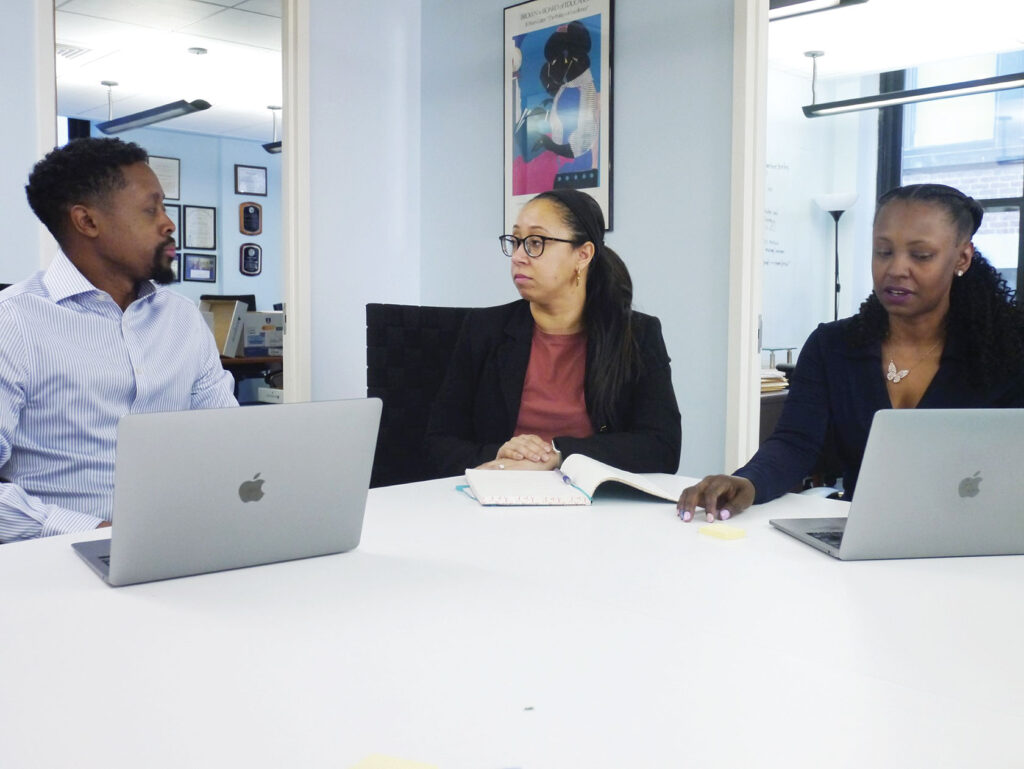Lawyers for Civil Rights takes on national issues
Group’s staff doubles in size and earns trust of local activists

Faced with a legal challenge to the City Council district map signed off on by Mayor Michelle Wu in October of last year, city officials mounted what some observers said was a weak defense, calling just one witness in a case that the judge ultimately decided in favor of the plaintiffs.
While civil rights groups are still smarting from the May decision, Lawyers for Civil Rights (LCR) has filed a motion to intervene in the case, a move aimed at giving the NAACP Boston Branch, MassVOTE, La Colaborativa and other community groups an opportunity to defend the voting rights of the city’s communities of color.
The legal maneuver was one of many LCR has engaged in during recent months, including defending a 9-year-old Black special-needs student whom Walpole police handcuffed; securing a settlement from the town of Needham after police there detained and handcuffed a Black man they confused with a shoplifting suspect; and filing a federal lawsuit against Florida Gov. Ron DeSantis and officials from his administration who flew more than 30 Venezuelan migrants to Martha’s Vineyard under false pretenses in what was widely seen as a political stunt.
In the last five years, LCR has ramped up its capacity to litigate cases, doubling its size as the organization takes on cases of national significance — including its suit against DeSantis and a challenge to the Biden administration’s immigration policies — and delves into local issues, including its federal lawsuit against the state’s admissions policies to regional vocational technical schools, which LCR says results in fewer students of color being admitted.
The group’s legal work has earned the respect of activists in Boston.
“When we identify a problem, they step up and represent us,” said MassVOTE Executive Director Cheryl Clyburn Crawford. “They do the work.”
LCR is an affiliate of the Lawyers’ Committee For Civil Rights Under Law, a Washington, D.C.-based nonprofit founded in 1963 at the urging of President John F. Kennedy after the assassination of Mississippi civil rights activist Medgar Evers and the inaugural address of Alabama Governor George Wallace, in which he vowed “segregation now, segregation tomorrow, segregation forever.”
The Boston Bar Association formed the Boston Chapter of the organization in 1968, as the city was experiencing its own struggles over racial inclusion. Under current Executive Director Iván Espinoza-Madrigal, who took the helm in 2015, the organization has continued its mission of litigating civil rights cases.
“Civil rights cases will not go away any time soon,” Espinoza-Madrigal told the Banner. “We are uniquely positioned to tackle civil rights and economic justice. We are taking that responsibility very seriously.”
Individuals and organizations regularly turn to LCR for help on cases involving education, employment discrimination, fair housing and voting rights.
Jeffrey Lopes, president of the Massachusetts Association of Minority Law Enforcement Officers (MAMLEO), says his group regularly turns to LCR for legal advice and litigation.
“They’re our go-to organization when things come up and we need advice,” he said. “We consult with LCR to understand what our legal standing is on an issue.”
Among the cases LCR is litigating for MAMLEO is a challenge to the Boston Police Department’s former use of controversial hair tests to determine whether officers have used illegal drugs. The department used the test for nearly two decades, despite an abundance of evidence that it produces false positives for people with African hair. LCR obtained rulings from the Civil Service Commission and the Massachusetts Supreme Judicial Court against the department’s use of the test, which the city eventually stopped using.
“They’re willing to fight,” Lopes said of LCR attorneys.
Under Espinoza-Madrigal, LCR has also delved into small business assistance, offering firms and entrepreneurs technical and legal assistance with challenges including incorporation, securing federal Payroll Protection Program loans during the pandemic and securing forgiveness for PPP loans.
Growing reach, growing team
As the organization’s reach has grown, it has taken on new staff, hiring four new attorneys earlier this year.
“The new attorney hires are going to help us ensure the growth of our legal services, including connecting even more with our client communities,” Espinoza-Madrigal said. “For example, they are helping to make sure that people do not (get) dropped off of MassHealth as the state engages in the redetermination of eligibility for hundreds of thousands of people on MassHealth.”
As LCR celebrates its 55th anniversary this year during a June 22 gala, special guests will include some of the migrants DeSantis and his administration steered to Martha’s Vineyard.
Espinoza-Madrigal said the organization will continue to broaden its impact.
“It’s been a lot of work, but it’s been rewarding work,” he said. “With the expansion of the team, we’ll seek out new opportunities to make a difference in the lives of the people we serve.”






